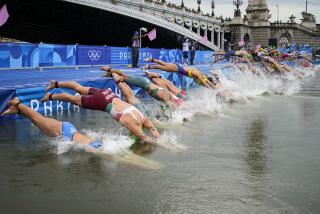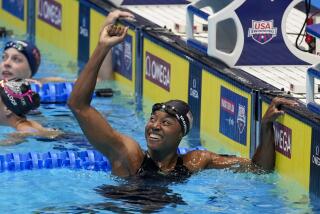Tri It, You’ll Like It
- Share via
The blood that should be in your legs has collected in your shoulders, and you’ve been horizontal for a half hour. But you only have a few moments to slap on some shorts and hop on a bike.
It’s that particular rush of triathlon, that John Brazelton, a 29-year-old biology teacher from Mission Viejo, enjoys. For him, mastering transitions between the competition’s biking, swimming and running legs offers the best reward.
The Newport Beach Triathlon on May 31 will be Brazelton’s fifth, and this year he has added inspiration--the 24 high school students he has recruited to share his admiration for the sport.
At the conclusion of one of his 6 a.m. swims at Crown Valley Park’s outdoor pool, Brazelton shook off some extra water, took a whiff of the chlorine hanging in the air and recalled how he recruited his Newport Harbor high schoolers.
“A lot of my students were interested after I got back from the Ironman competition in October,” said Brazelton of his return from the annual Hawaii triathlon. “A few of them asked, ‘did you win?’ I said no and they said ‘well why did you do it if you didn’t win?”’
A logical question, Brazelton conceded, but as he explained to them, “it’s about finishing, setting goals for yourself, accomplishing what you can. And you can apply it to schoolwork, like aiming for a 3.0, or getting through a tough class. It starts to carry over.”
He believes his biology students should use the Newport Beach Triathlon as their training ground. The event is a beginner-friendly race that draws its share first timers as well as professionals.
The Newport Beach Triathlon, which until this year was called the Human Race, is the oldest continually running triathlon in the country. One of its competitors, the Mission Viejo Performing Arts Triathlon ended its run last year. Through downpours, Santa Ana winds, floods and misdirected traffic wandering into the race route, the race has gone on every year since 1978 without any major injuries. It has also managed to maintain a casual fun-in-the-sun atmosphere.
*
The course begins at the Newport Dunes with a half-mile swim in the Back Bay, then 13 miles of cycling through Newport Beach and Irvine and finally a three-mile run around the Back Bay area. Organizers expect 700 to 800 competitors this year, and the average time should be just over an hour and a half.
“It’s more of a grassroots event than many of the others,” Brazelton said. “It’s a race where people are out there to have fun and you spend most of it cheering them on.”
This is where the occasional armchair athlete realizes that the triathlon is not beyond his reach. “People think it’s an insanely difficult sport, but it’s just three things that people do all the time put together into one package. And it’s accessible to everybody,” Brazelton said. “If you want to compete in the Super Bowl, you can’t. But just about anyone can get into this.”
Jack Caress, one of the race organizers, said he’s constantly dispelling the myth that the triathlon is an impossible dream. “When you think about it, as a kid you swim, you bike, you run. It’s unusual not to, especially in Southern California. Most people have done all of them at one time or another. We just combine them.”
The perception of triathlon-as-gruelathon comes mostly from the notoriety of the Ironman competition, an annual event in Hawaii that shows the sport at its most taxing--a 2.4-mile swim, 112-mile bike and 26.2-mile run. But the Ironman distance is the exception, not the rule for triathletes.
Brazelton took up triathlon after being plagued by injuries as a runner at UC Irvine. “A teammate of mine got me out swimming and bicycling and I found it was great for preventing injuries. It’s just basically like cross training.”
Training for triathlon, Caress said, can be as easy as a trip to the shore. “Let’s say this weekend you go to the beach. You ride your bike there, you swim in the ocean, you run on the beach--that’s a triathlon.”
Brazelton is a bit more methodical. Near competition time, Brazelton said he’s not radical just sensible, steering clear of junk food and fast food. “My wife says I eat one meal a day, it starts when I wake up and ends when I go to bed,” Brazelton said. “And I’ve been known to sit down with a couple of friends named Ben and Jerry.”
He tries to train for each sport three times a week, interspersed with weight training. He combines the three once a week, giving himself practice on the sport’s most feared moment: the transition.
“When you get off the bike to start running, you feel like, ‘you gotta be kidding.’ It takes a good amount of time to get into the rhythm because your legs just want to keep going in a circle.”
He has experienced his share of spills. “The first time I competed I wound up running too hard. I wasn’t experienced. I got in a bike crash and lost a lot of skin. I should have been taking it slow, having fun. It’s always better to say I could have gone faster than to crash.”
He learned quickly the message he would eventually pass on to his students about the Ironman. “It’d be great to win that race but I just love being in it. There’s nothing else like it.”


